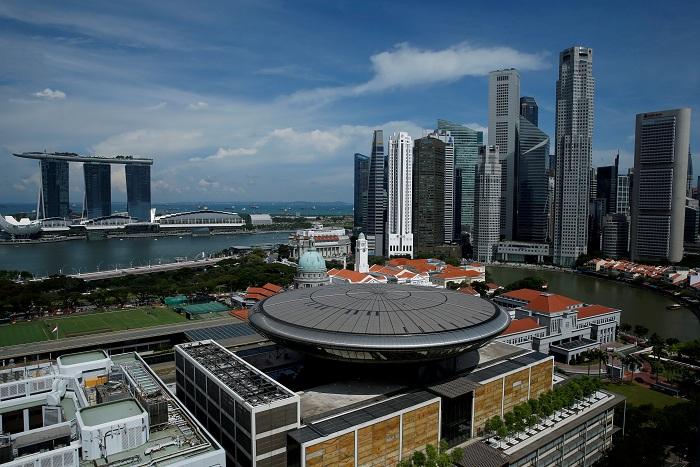
Singapore's economy expanded at a much slower pace than initially thought in the third quarter, with the government flagging further moderation in the current quarter and warning that the U.S.-Sino trade war will hurt growth in 2019.
The weakening outlook for the prosperous city-state - a bellwether for global growth because international trade dwarfs its domestic economy - underlines a shakeout in financial markets in recent months as investors worry about world trade, investment and corporate earnings prospects.
The economy grew 3.0 percent in the July-September quarter from the previous three months on an annualised and seasonally adjusted basis, revised final figures from Ministry of Trade and Industry (MTI) showed on Thursday.
That was well below the government's initial estimate in October of 4.7 percent growth and also a median forecast of 4.2 percent in a Reuters poll of 11 analysts. In the second quarter, the economy expanded 1 percent.
The weaker than expected economic momentum in the third quarter was largely driven by slackening in the manufacturing sector, a factor that looks set to keep policy makers cautious given the worsening international trade environment and the Sino-U.S. tariff row.
"We did expect industrial production growth to moderate. But the pace of moderation was more prominent than initially thought," UOB economist Alvin Liew said.
The city-state's manufacturing sector grew at 3.5 percent in the third quarter from a year ago, slowing sharply from 10.7 percent growth in the quarter earlier.
SLOWER GROWTH IN 2019
On a year-ago basis, gross domestic product grew 2.2 percent in the third quarter, slower than the advance estimate of 2.6 percent growth, and below a 2.4 percent rise forecast in the Reuters poll.
The MTI revised its forecast for GDP growth for 2018 to 3.0 to 3.5 percent, from 2.5 to 3.5 percent previously. It gave a wide range for 2019's GDP growth forecast of between 1.5 to 3.5 percent.
"The external demand outlook for the Singapore economy in 2019 is slightly weaker as compared to 2018. At the same time, risks in the global economy are tilted to the downside," Loh Khum Yean, permanent secretary for trade and industry said.
Singapore's policymakers have repeatedly warned that a heated trade war between the United States and China - one of the city state's major trade partners - could hurt the domestic economy.
"There is the risk of a further escalation of the ongoing trade conflicts between the U.S. and its key trading partners, which could trigger a sharp fall in global business and consumer confidence," Loh said.
Export growth to China has slowed for 5 months in a row, raising worries about the outlook as the Sino-U.S. trade tensions showed no signs of abating.
A Singapore central bank official told reporters at a news briefing following the data release that the inflation and monetary policy outlook remains unchanged.
The Monetary Authority of Singapore, which manages policy through changes to the exchange rate rather than interest rates, has tightened monetary settings at both of its semi-annual meetings this year, most recently in October.
Analysts at Capital Economics cautioned of further pressure on the economy from steady interest rate increases by the U.S. Federal Reserve.
"Looking ahead, the outlook for Singapore's economy will depend in large part on the prospects for the global economy," they said.
"Local interest rates are already at their highest since the global financial crisis and are likely to increase further if the U.S. Fed continues to raise rates, as we expect."








